Africa is a dangerous place and its people are inherently violent.
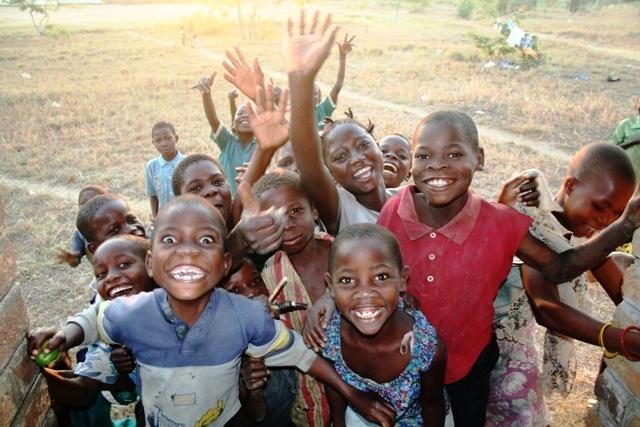 Although
there certainly are pockets of violence and no-go areas on the
continent, cycling in rural Africa is as safe as cycling in rural areas
in Europe or North America. In most areas, you can leave your
bike outside shops, have a stroll around the village and even hike up
to see a waterfall and when you return your bike and belongings will be
there when you return.
Although
there certainly are pockets of violence and no-go areas on the
continent, cycling in rural Africa is as safe as cycling in rural areas
in Europe or North America. In most areas, you can leave your
bike outside shops, have a stroll around the village and even hike up
to see a waterfall and when you return your bike and belongings will be
there when you return. Some African mega-cities such as Dakar, Johannesburg and Lagos live up to their reputations as dangerous places and you certainly wouldn’t want to plan a tour through conflict zones such as Somalia or Eastern Congo.
Fortunately, with a little planning these places are easily circumnavigated. In most African capitals, keeping your street-smarts suffices to stay clear of harm’s way. During the two years we spent cycling around the continent, most Africans we encountered were gentle, humble and hospitable. They warmly welcomed us into their villages and shared generously of all they possessed.
African roads are so bad they’re impossible to cycle on.
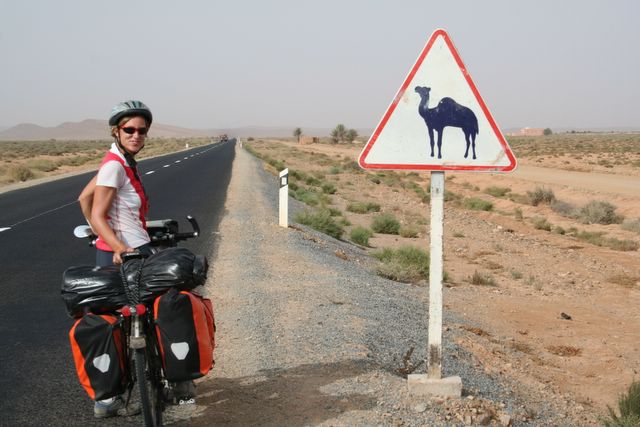 While it is true that Africa lacks a
comprehensive paved highway network, that’s part of the fun.
While it is true that Africa lacks a
comprehensive paved highway network, that’s part of the fun. Bouncing along on a narrow track waving at giggling toddlers, exchanging greetings with kids trudging off to school, stopping to chat with villagers on their way to the fields—the back roads are the best way to discover the real heart of Africa.
Roads can be rough, especially after heavy rains, so you may not be able to cover as much distance in a day as you would in other parts of the world. With a little practice, though, you’ll soon become a pro at cycling through seas of sand, navigating rock-strewn roads and navigating through muddy, rutted tracks. And for those of you with overly-sensitive bums, don’t despair. You can cycle almost 12,000 kilometres all the way from Cairo to Cape Town on smooth tarmac with less than a thousand kilometres on unpaved roads.
Africa is too hot for cycling.
Africa is full of ‘dangerous’ wildlife.
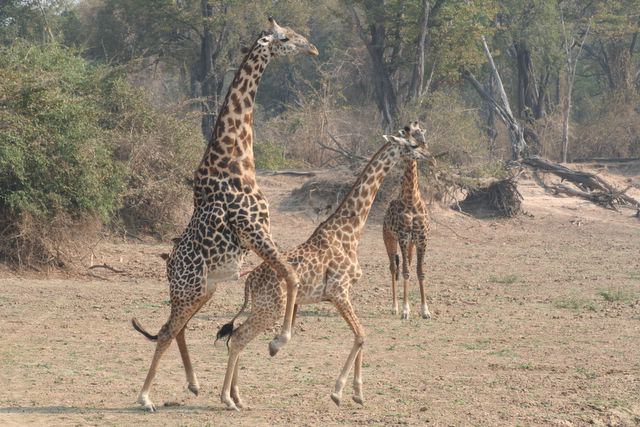 Viewing
wildlife is the number one reason most people jump on a plane and shell
out thousands of dollars for a safari. But bicycle touring in
Africa doesn’t mean being constantly on the lookout for charging herds
of elephants.
Viewing
wildlife is the number one reason most people jump on a plane and shell
out thousands of dollars for a safari. But bicycle touring in
Africa doesn’t mean being constantly on the lookout for charging herds
of elephants. In fact, on most of the continent, the encroachment of human means you’ll have to go out of your way to see wild animals.
That said, one of the best biking spots for wildlife viewing from the saddle is in Botswana. We whizzed by zebras, elephants, and mating giraffes on the main highway. Mikumi National Park in Tanzania is also a great ride for wildlife viewing. Riding near the NamibRand reserve in Namibia is a good place to spot gemsbok, mountain and plains zebra, springbok and kudu.
Most wild animals aren’t really dangerous as long as you don’t do something really stupid like the guy in Sudan who keet moving closer and closer to get shots of those cute hyenas. The word on the overland trail is that he got eaten and all that was left was a pile of bones and some nice close-up shots of hyenas.
What are Africa's most dangerous animals? Here’s the top 10 list of Africa's most deadly animals (meaning any living thing): the hippo, lion, crocodile, mosquito, black mamba, great white shark, buffalo, elephant, puff adder, and of course man himself.
After the mosquito, a cyclist’s biggest worry will be staying clear of the elephants and buffalo.
Africa is very corrupt and I will have to pay many bribes.
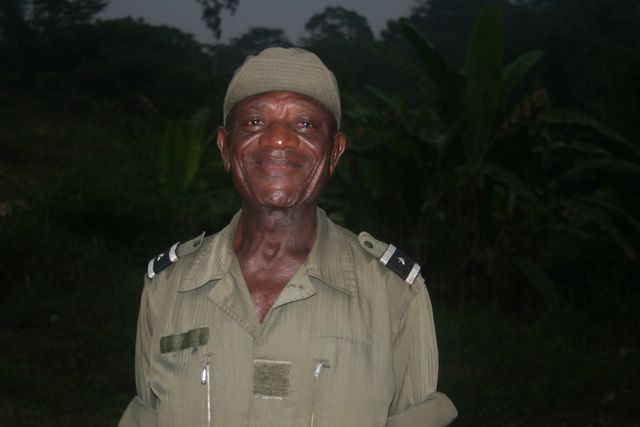 You’re
highly unlikely to encounter any type of corruption in East Africa or
Southern Africa. Minor corruption in West and Central Africa,
on
the other hand, is quite common. We were regularly asked to
pay
miscellaneous ‘processing fees’ at border crossings and police
checkpoints and sometimes asked to make a contribution towards a beer,
soft drink or fuel for the generator. By standing firm,
remaining
friendly and being patient I never ended up paying and bribes or extra
fees except on one unlucky occasion in Equatorial Guinea.
You’re
highly unlikely to encounter any type of corruption in East Africa or
Southern Africa. Minor corruption in West and Central Africa,
on
the other hand, is quite common. We were regularly asked to
pay
miscellaneous ‘processing fees’ at border crossings and police
checkpoints and sometimes asked to make a contribution towards a beer,
soft drink or fuel for the generator. By standing firm,
remaining
friendly and being patient I never ended up paying and bribes or extra
fees except on one unlucky occasion in Equatorial Guinea.I will have trouble finding food if I cycle through Africa.
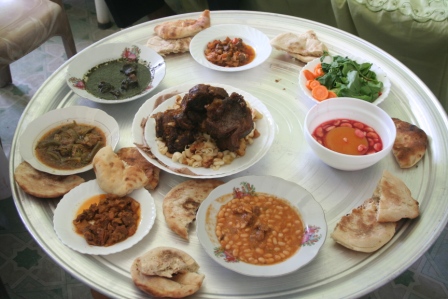 Food
shortages do occur in Africa, but as a cyclist with money to spend you
are unlikely to be affected by them. We spent two years
cycling
through Africa, including some very remote stretches where most of the
local population was living off food relief provided by international
aid agencies, and we were always able to buy food locally.
Markets may not be overflowing, but you’ll find enough staples to fuel
you on to your next biking destination.
Food
shortages do occur in Africa, but as a cyclist with money to spend you
are unlikely to be affected by them. We spent two years
cycling
through Africa, including some very remote stretches where most of the
local population was living off food relief provided by international
aid agencies, and we were always able to buy food locally.
Markets may not be overflowing, but you’ll find enough staples to fuel
you on to your next biking destination.Africa is full of scary diseases and I’ll probably fall deathly ill.
Bilharzia, Cholera, Diarrhoea, Amoebic Dysentery, Hepatitis A and B, Rabies, Typhoid, Yellow Fever and E-coli.
The trick to staying healthy in Africa is to get all the necessary immunizations and taking the right anti-malarials. Then the chances of falling ‘deathly ill’ and needing to be repatriated are greatly diminished.
Africa
is poor and therefore filthy.
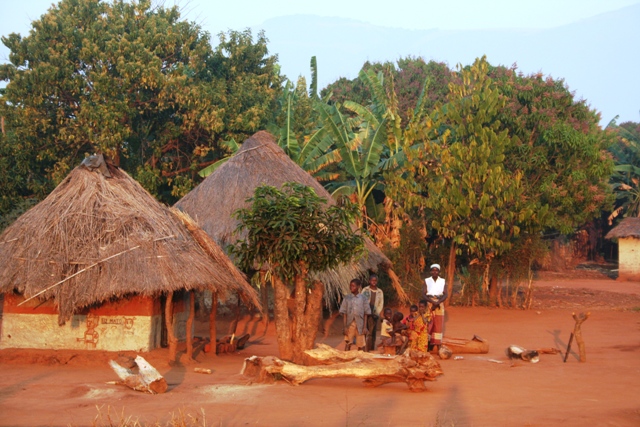
Africans
know nothing about personal hygiene.
Off
the beaten path I’ll never have the chance to bathe.
Nothing could be further from the truth. Africans are fastidious about personal cleanliness.
The
water in Africa is not safe to drink.
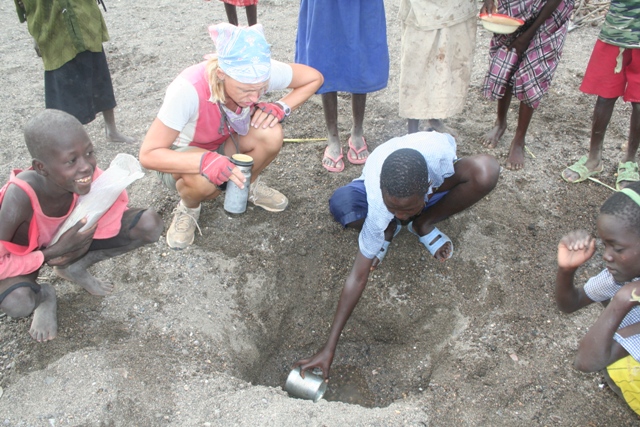
If you enjoyed this post, you'll like these posts, too:
Staying
Healthy
Getting
Started
Tips for Choosing
Travel Insurance>>
We recommend
World Nomads
Staying
Healthy
If you enjoyed this post, please share it with others via Twitter.
What
are your experiences biking in Africa? Ever debunked any
myths about
cycling in other
parts of
the world?
Please share in the comments section below.

| Get World Biking Newsletter |
| Email: |
| |
check out more photos from our trip
contact us at: worldbiking@gmail.com




